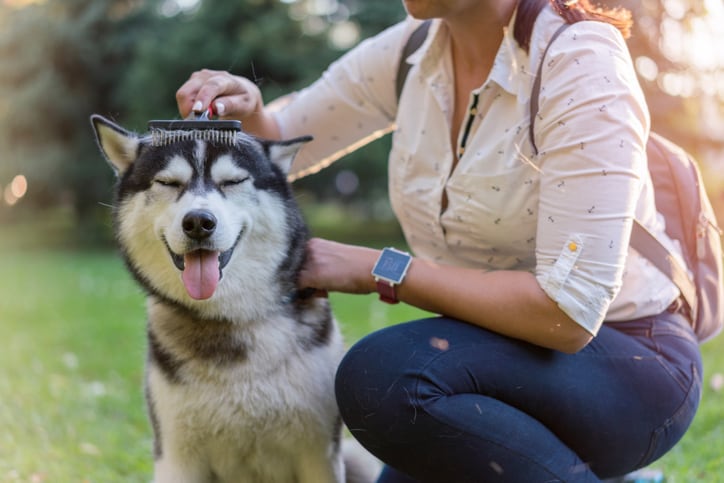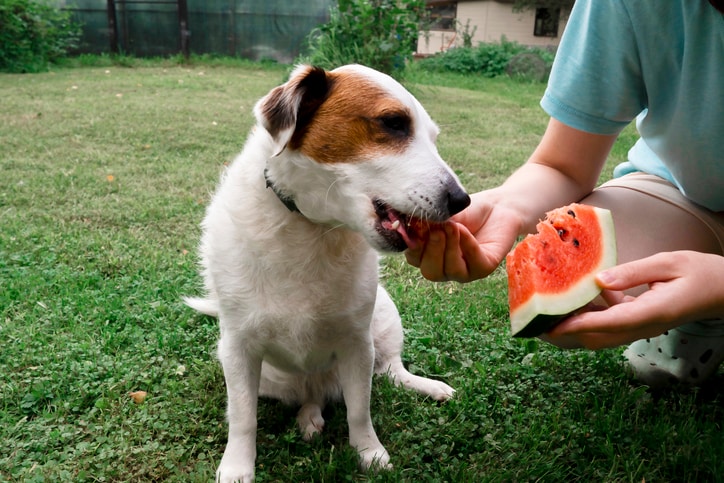There’s nothing better than a snuggle with your favorite pup, except when your furry friend is having a bit of an issue with smelling not so fresh. But how do you make a stinky dog smell better? And why do dogs smell bad in the first place?
Why dogs smell so bad
“Who says dogs smell bad?” jokes veterinarian Dr. Regina Watters. “They probably think that we humans smell bad,” she adds. All kidding aside, she says, “the regular body odor of a healthy dog is normal for them, and it is only our close association with them that allows us to notice their normal odor.”
Any uptick in your dog’s usual odor could be caused by anything from lack of grooming or a skin infection to dental problems or anal gland issues, says veterinarian Dr. Nicole Savageau.
Ears are another place where smells can hide. “If they have floppy ears, they may be prone to infection which can cause odor,” says Savageau. With these types of dogs, you’ll need to pay special attention to their ears when bathing.
That means it might be time for a little trial-and-error smell management TLC. After all, the first step toward having a better-smelling dog is to figure out any underlying cause of your dog’s odor and safely try to tame it.
How to make a stinky dog smell better
All dogs smell like, well, dogs, but your dog doesn’t have to smell so strongly that you can’t stand to snuggle. So what are some ways you can keep your dog smelling fresh, or at least smelling a little better? Dr. Dilber Hussain, veterinarian, offers the following tips for warding off dog stink.
1. Brush your dog frequently
“Use a firm-bristled brush and make sure to get down to the skin to ensure that all dead hair and dirt is removed,” says Hussain. “Brushing should be done at least twice a week, or more frequently if your pup has a long coat.”
2. Trim your dog’s hair
Depending on breed, you should trim your dog’s hair every 4-6 weeks. Always use sharp clippers and be gentle with your dog’s skin — or a good dog groomer can always take on this job with special care. Not sure if your dog’s breed calls for frequent trims? Ask your veterinarian or dog groomer.
3. Clean your dog’s ears
Look for any dirt or debris and use a cotton ball to remove it. Also check for any signs of infection, such as irritated-looking skin, and let your vet know about any problems. Make sure that your dog’s ears are dry again before you let them outside.
4. Bathe your dog regularly.
“Bathing your pup is important to keep their skin and fur clean and healthy,” says Hussain. How often your dog needs a bath depends on breed and activity level; Hussain recommends bathing your dog every 2-4 weeks as needed, though this timeline varies depending on the aforementioned factors, such as how dirty they get in general and what type of care their specific fur needs.
Joan D., owner of golden mountain dog Onyx, lives on eight and a half acres of reforested land in Ontario, Canada, and as a result, Onyx gets “pretty muddy, snowy and dirty!” Onyx takes trips to the groomers every three months, and in the interim, Joan uses a dry shampoo for dogs put out by Burt’s Bees. “It helps him smell good and keeps his coat shiny!” she says.
5. Brush your dog’s teeth.
Use a toothbrush that’s designed for dogs and “fits comfortably in your hand.” Hussain says you should brush your dog’s teeth once a week to remove plaque buildup. It may take some time for your dog to get used to getting their teeth brushed, he adds.
6. Clip your dog’s nails.
Use clippers designed for dogs, not humans, and keep your dog’s nails trim, says Hussain. This will help keep smelly bacteria to a minimum. “Always trim the nails at a slight angle, and avoid cutting too close to the skin. If you’re not confident in doing this yourself, speak with your vet or groomer for help.”
7. Check your dog’s skin
Periodically check your dog’s skin for any signs of abnormal growths, lumps or signs of irritation. These could be signs of a variety of different conditions that are often responsible for causing a foul odor.
8. Treat any fleas or ticks.
If you find ticks or fleas on your dog, treat them right away, says Hussain, as they can lead to serious health issues, which are often associated with bad smells.
9. Pay attention to your dog’s coat.
“Pay attention to how their fur feels, smells and looks,” says Hussain. If anything seems off, talk to your vet.
10. Schedule regular vet visits.
“This can help to ensure that any emerging issues are caught early on,” says Hussain. Speak to your vet about any grooming concerns you might have.
What to try if none of this helps your dog smell better
What if you’re doing everything the experts recommend to keep your dog smelling good, but there’s still an issue?
“The underlying cause of the odor may not be related to dirt or bacteria,” says Savageau. “Some dog breeds are more prone to strong odors. Potentially a change in the product used to wash them is needed, one that may be better suited at removing odor.”
11. Try a new dog shampoo
When you’re choosing a shampoo, make sure that it’s specifically formulated for dogs, as human skin has a different pH than dog skin and using human shampoo can disrupt the balance of natural oils, leading to dryness and irritation.
“If your dog has a specific skin condition or you’re unsure about what type of shampoo to use, it’s a good idea to consult with your veterinarian for recommendations,” says Savageau. They’ll be able to point you in the direction of a shampoo that’s suited to your dog’s unique needs.
Also, before using any essential oils on your pup, be sure to check with your vet first. While some may be fine, others can seriously harm your pet.
12. Manage smelly dog breath
If your dog’s smell is a breath issue, Savageau says there are some foods you can safely feed your pup that can help:
- Carrots are “crunchy so they can help clean your dog’s teeth,” says Savageau.
- Yogurt has good bacteria to promote gut health.
- Coconut oil has many antibacterial properties that can help to freshen breath.
Read more: 10 ways to tame bad dog breath
When to worry about dog stink
While a certain amount of doggy scent is to be expected, there are certain reasons why a dog’s pleasant smell can go from bad to potentially dangerous.
“Any change from a normal dog odor, which they all have, may be a signal of a potential health issue with your dog or his skin which requires attention,” says Watters.
If you can’t determine the source of your dog’s new or increasingly bad smell, consult your veterinarian right away.

